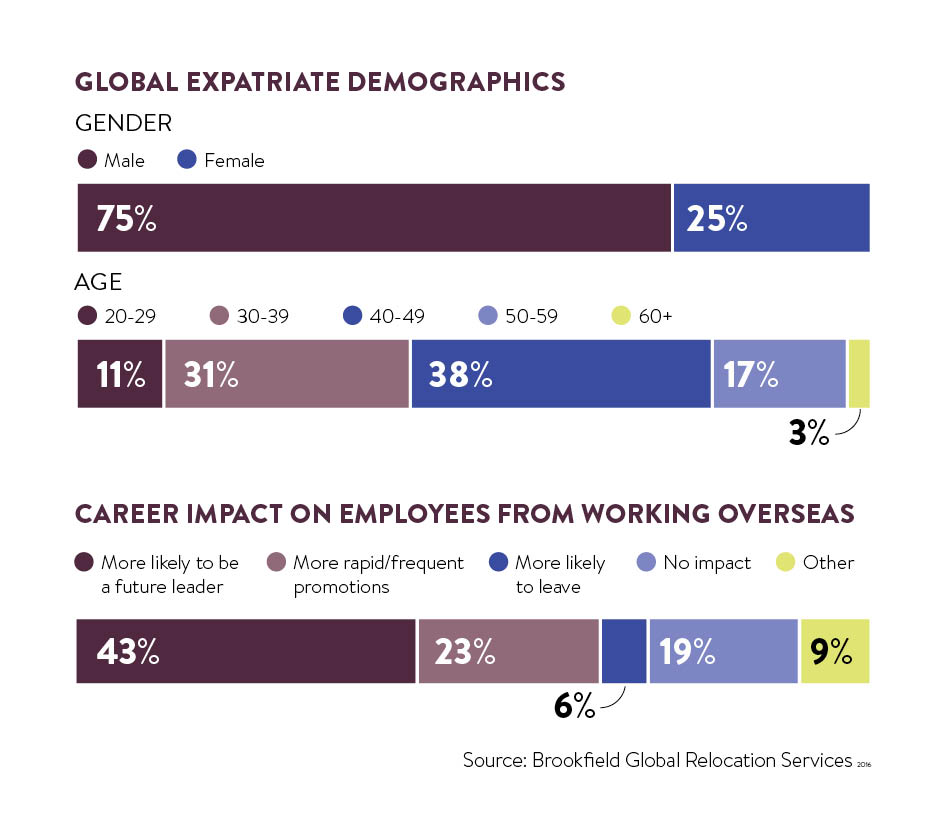In an increasingly global world, managing international assignments has become an important part of the human resources role.
“Some industries use mobility as a developmental tool, especially for early-career employees on a high-potential track,” says Lisa Johnson, global practice leader in consulting services at Crown World Mobility. “However, some organisations have business models that rely on meeting their client contracts and needs around the world.”
Such placements are particularly common in sectors including professional services, IT, engineering and financial services, says Gerwyn Davies, policy adviser at the Chartered Institute of Personnel and Development. “The EU and the US remain our biggest trading partners,” he says. “However, we have seen a sharp increase in the number of employees who are being sent to emerging markets, especially in the Middle East, Hong Kong and Singapore.”
HR challenges
But managing such assignments, whether temporary or longer term, presents a number of challenges for HR. An obvious consideration is safety. “Terrorist attacks, plane crashes, civil unrest, natural disasters, epidemics, kidnapping and identity theft are just some risks that companies must take very seriously,” says Matthew Judge, group managing director at Anvil, operational and travel risk management specialists. Organisations have a duty to warn employees of any potential dangers and to conduct appropriate risk assessments, he adds.
At a practical level, those heading overseas need support when they arrive in destinations and in helping to settle in. “The key is to have support in the office where someone is placed, not just back at their original office,” says Darren Minshall, UK group chief talent officer at Havas Media Group. “That way you can offer extra support when it is really needed, but the day to day is looked after from their current ‘house’.”
Organisations have a duty to warn employees of any potential dangers and to conduct appropriate risk assessments
HR needs to pay particular attention to helping people settle into life outside work, says Carl Redondo, leader of Aon’s global benefits practice. “When moves are unsuccessful, it is typically due to an underestimate from the individual or employer about the change in overall environment,” he says. “There is a lot of focus on the role, but not enough on how the individual will spend their free time, how their family will cope, and the overall social and environmental aspects.”

Stacie Groce, director of global mobility solutions at oil and gas recruiter Airswift, says the issue of education can be particularly important for those with families. “Those travelling with spouses and families will require additional support,” she says. “Ensuring the right education opportunities are available, being able to introduce people to schools, informing them about term times and even paying the fees can be incredibly important.”
At the same time, HR needs to ensure employees based overseas do not feel isolated from their home country. “When you are abroad, you are cut off from a lot of conversations and people at home think you know what is going on,” says Professor Marie-Therese Claes, leader of CEMS Global Leadership and Cross-Cultural Group. “It is the ex-pat’s role to keep their network active, but HR should keep in mind the people out there and provide them with extra information.”
Shifting assignment lengths
Repatriating people after an assignment can be particularly problematic and can throw up a number of challenges. “In some cases, the home country management has failed to allocate the assignee to a big enough role on their return, regardless of their growth overseas,” says Louise Fisher, Xerox’s HR director for Europe, the Middle East and Africa. “I’ve also seen multiple cases of the assignee wanting to remain in the new country and limiting their opportunities for advancement as a result. Repatriation is as much a part of managing the assignee as the assignment itself.”
Some organisations are now moving away from longer-term assignments in favour of shorter projects designed to give employees specific international experience. Deloitte, for instance, has created three university-style campuses where top talent can be sent for up to two weeks, as well as undertaking projects from their home country.
“The advantage of this approach is that it facilitates global networking and relationship-building without long-term moves, and can limit cost, administration and compliance risks,” says Andy Robb, a partner in the firm’s global employer services practice.
There are a number of benefits for those organisations that are able to offer employees international exposure. Research by IDC European Software and Cornerstone OnDemand found nearly a fifth more people said they were happy in their job in organisations that allowed internal mobility, while allowing such freedom of movement had a positive impact on growth in 28 per cent of cases.
In the future, there’s likely to be more rather than less need for employees to gain experience of working overseas, says Gary Miles, director of international relations at Roffey Park leadership institute, with opportunities arising in South America, Asia and Africa. “Such assignments bring out all-round skills in employees as they develop cross-cultural insights and international contacts,” he says. “They can be the forerunners of greater things to come or even result in some organisations running more operations out of another part of the world.”
CASE STUDY: DEUTSCHE TELEKOM
 Deutsche Telekom employs around 230,000 people around the world, and deploys talent in different countries both to meet customer demand and develop its employees. It has also recently developed a new framework for executives, which has international assignments of anything up to three years as a core requirement.
Deutsche Telekom employs around 230,000 people around the world, and deploys talent in different countries both to meet customer demand and develop its employees. It has also recently developed a new framework for executives, which has international assignments of anything up to three years as a core requirement.
For human resources, this means having to get to grips with the practical issues. “HR needs to focus on the human side – is the employee taking family with them?” asks Sarah Sandbrook, HR director at T-Systems, the UK corporate customer arm of Deutsche Telekom.
“How will the employer support and equip the employee for a different business culture and living in a different culture? What management and leadership skills are needed? Training and coaching may be required; what made an employee successful in one country may not be the same in another country,” she says.
How much contact there is with the home country for those abroad depends on the length of the assignment, says Ms Sandbrook. “If the contract is for three years, the aim will be less about keeping in touch and more about helping the individual to make the most of where they are, while not severing ties completely,” she says. “At the point of coming back, thoughts will turn to reintegration.”
Ms Sandbrook believes the business gets a number of benefits from its approach to international assignments. “We can deploy our best talent where it is most needed, which helps us to grow more successfully, while employees are able to broaden their experience,” she says.
HR challenges

